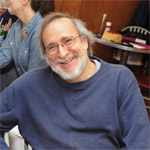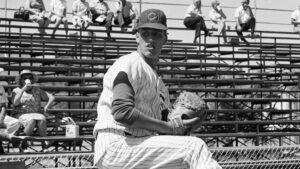That was quite a lovely farewell the New York Yankees gave this past weekend to John Sterling, who has turned off his microphone and retired after 36 years as the baseball team’s radio voice.
Sterling did the play-by-play for 5,631 Yankees games. That’s nearly as many games in The Bronx as Babe Ruth, Lou Gehrig and Derek Jeter — combined. It’s a measurement of Sterling’s professionalism, respect for the game and sense of great theater. And it’s a measurement of the tough New York audience’s affection for him.
But we knew Sterling around Baltimore long before he got to Yankee Stadium. He sat in a little studio on North Charles Street from the mid-1960s until the early ‘70s. It wasn’t nearly as long as his New York career. But maybe in its way, it was as meaningful.
He was one of the earliest of radio’s two-way talk-show hosts. He worked for WCBM, 680 on the AM dial, when AM radio still had cultural clout and WCBM was one of Baltimore’s most respected broadcast outlets.
They played music during the day, and the disc jockeys included such talented folks as Mike March, Larry Walton, Johnny Contino, Larry Hall and Lee Case. In the newsroom, there was the veteran Eddie Fenton, a young Richard Sher, Bob Schilling and Dave Humphrey.
At night, the music stopped and the sound became a community talking to itself. Sterling hosted some of it, and then Gene Burns came along, and later there was Alan Christian.
But in those early years, it was mostly the voices of ordinary citizens all around the Baltimore area, trying to talk things out in a difficult time while those such as Sterling brought a civil, moderate tone to the debate.
We think the country’s polarized today — and we are. But Sterling’s time here was even angrier, an era of war in Vietnam, and riots in the streets, and racial tensions that seemed always on the edge of bubbling over.
Those who sat behind radio microphones knew they had a responsibility, not to add to the tension but to try to put some of it into perspective and offer whatever words of healing were in the air.
That doesn’t mean they were there as social workers. Sterling knew how to needle callers who got out of hand. There’s still memory of the night a stuffy caller asked him, “Do you know the history of China?”
“Somebody told it to me once,” Sterling replied. “But I forgot it.”
The quip lightened a moment that might have become pompous.
But the airwaves, and the various social media, have become poisonous today. A few generations of talk-show hosts have come and gone, hoping to become the next Rush Limbaugh.
They sit in windowless rooms and pretend to understand the whole wide world. Sterling’s generation had enough respect for their audience not to pretend to be know-it-alls.
Sterling waited until he got to New York to strut his expertise — and he did it in a town where everybody thinks he’s an expert about everything.

A former Baltimore Sun columnist and WJZ-TV commentator, Michael Olesker is the author of six books, including “Journeys to the Heart of Baltimore” (Johns Hopkins University Press) and “Michael Olesker’s Baltimore: If You Live Here, You’re Home” (Johns Hopkins University Press).





